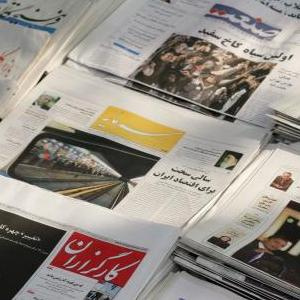Tehran's Daily Newspaper Review

Ayatollah Khamenei’s meeting with quadriplegic wounded-in-action soldiers of the 8-year Iran-Iraq war dominated the front pages of Iranian newspapers today, while it seems that the 2.6 billion dollar bank fraud won’t be leaving the front pages for weeks.
Iran assured its readers that the embezzlement will be dealt with effectively, quoting remarks from the Minister of Economy and the Central Bank Chairman who promised a regenerating of the banking system and punishing the perpetrators behind the scandal. Ayatollah Khamenei was cited saying that “quadriplegic WIAs’ sacrifice is greater than martyrdom,” in his visit with victims of the war waged by Saddam Hussein. In its editorial, Iran made another effort to attract attention to a speculative venture of a financial agency affiliated with Tehran Municipality –administered by Ahmadinejad’s powerful rival Baqer Qalibaf.
“Aftershocks of the great embezzlement persist,” Jomhouri-ye Eslami reported, covering a letter released by dismissed president of Saderat Bank Mohammad Jahromi, in which he accused the key supporters of the corruption case for ousting him from his position. Jahromi also claimed that Mahmoud Khavari, former head of Melli Bank who resigned in the wake of the disclosure of the bank fraud, has fled to Canada to avoid prosecution. In the meantime, Ayatollah Sadeq Larijani’s assertion that “there are no exceptions or redlines in probing [corruption] cases” was covered by Jomhouri-ye Eslami. “Dignifying WIAs is a serious need of the society and the Nezam,” Ayatollah Khamenei was quoted by the newspaper.
“Honest service to WIAs is one of the most prominent forms of jihad,” Kayhan cited Iran's Supreme Leader. Setting Shi’a citizens’ houses on fire was also called “another crime by Al-Khalifa” in Kayhan. The newspaper also reported that a number of private bank presidents are to be dismissed in the near future. The editorial explained the causes and consequences of Ali Abdullah Saleh’s return to Yemen, and its interplay with two well-known Yemeni clans, i.e. the Houthis and the Southern Yemenis.
Resalat’s top headline was extracted from Ayatollah Khamenei’s meeting with janbazan (1), where he stated that sacrificing life-long health for the sake of Islam is a [rejoice-worthy] bargain with God. Members of Parliament approved -“finally”- a bill that sets new mechanisms for supervision over their conduct during their tenure. In Resalat’s editorial, Saleh Eskandari argued that paying homage to WIAs will reinforce the Islamic-Iranian culture and the revolutionary identity of the Iranian nation. In Iran, the author maintained, the establishment are not senior politicians, the wealthy class or the media, but those anonymous citizens who saved the Nezam in the years of turmoil.
Shargh’s front page focused on the Ahmadinejad administration’s abrogation of law, from crediting the surplus of oil revenue to an overseas branch of Melli Bank (instead of to the treasury), to refusing to report on its accomplishment of the Fourth Development Plan. Shargh also quoted Judiciary Speaker and special investigator for the 2.6 billion dollar embezzlement case, saying that it is better for Melli Bank President Mahmoud-Reza Khavari to return to Iran, otherwise, he may turn into the main target of accusations.
Tehran-e Emrooz also focused on the bank fraud and the Supreme Leader’s visit with war veterans in its front page. The newspaper also reflected criticisms against FM Ali-Akbar Salehi’s visit with his Bahraini and British counterparts on the sidelines of the UN General Assembly in New York. The editorial of Tehran-e Emrooz was a eulogy on the devotion of Iranian wounded-in-action soldiers.
(1) Janbaz (and its plural form Janbazan), which can be translated as ‘life-sacrificers’, is used to refer to those who suffer chronic injuries from the 8-eight year war with Iraq (amputees, victims of Iraq’s chemical attacks, etc.), synonymous to Wounded in Action in the US military vocabulary.
* Notes:
The editorial section of Iranian newspapers is not the work of the editor-in-chief or the senior editorial staff of the newspaper by default, but can be a contribution by experts and politicians (typically agreeing with the newspaper’s political stance.)
Vatan-e Emrooz daily does not publish on Thursdays.
Trouble with understanding some terms? Check our Glossary of Iranian Political Terms.
Briefing
Hamshahri (Citizen) is the official daily newspaper of Tehran's Municipality. Its general directions in politics, culture and economy are determined by the mayor of Tehran, currently Mohammad Baqer Qalibaf.
Iran is the official organ of the administration.
Jomhouri-ye Eslami (The Islamic Republic) was known as the official organ of the Party of the Islamic Republic, founded in 1979 and disbanded in 1987. Currently, it is an open critique of Mahmoud Ahmadinejad's policies and is known to be a mouthpiece of Akbar Hashemi Rafsanjani.
Kayhan (Universe) is a hard-line conservative newspaper. Its editor-in-chief –currently Hossein Shari’atmadari- is appointed by Iran's Supreme Leader. Shari’atmadari’s editorials often spark off controversy and debate inside Iranian political circles.
Khabar (News) is a principlist daily newspaper which adopts a critical stance towards Ahmadinejad's policies.
Resalat (Mission) belongs to the moderate wing of the principlist camp. Resalat’s best known analyst is Amir Mohebbian, its political editor.
Shargh (East) is a moderate reformist newspaper. It was the most popular and influential reformist newspaper in its first period of publication which lasted from August 2003 until September 2006.
Tehran-e Emrooz (Tehran Today) is a ‘principlist reformist’ newspaper, connected to Mohammad Baqer Qalibaf.
Vatan-e Emrooz (Motherland Today) is a supporter of the president’s policies.

